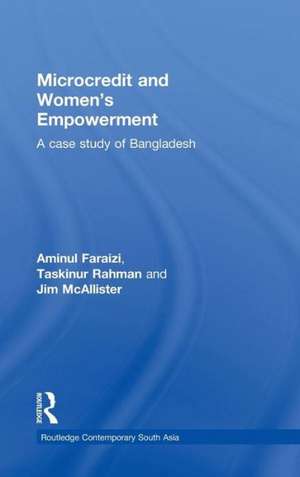Microcredit and Women's Empowerment: A Case Study of Bangladesh: Routledge Contemporary South Asia Series
Autor Aminul Faraizi, Taskinur Rahman, Jim McAllisteren Limba Engleză Hardback – 20 dec 2010
The book goes on to establish that the well-publicised success stories of the microcredit programme are blown out of proportion, and that the dynamics of collective responsibility for repayment of loans by a group of women borrowers – usually seen to be a tool for the success of microcredit – is in fact no less repressive than traditional debt collectors. This book makes a contribution to development debates; challenging adherents to more closely specify those conditions under which microcredit does indeed have validity, as well as providing insights relevant to South Asian Studies and Development Studies.
| Toate formatele și edițiile | Preț | Express |
|---|---|---|
| Paperback (1) | 407.01 lei 43-57 zile | |
| Taylor & Francis – 12 sep 2014 | 407.01 lei 43-57 zile | |
| Hardback (1) | 1054.97 lei 43-57 zile | |
| Taylor & Francis – 20 dec 2010 | 1054.97 lei 43-57 zile |
Din seria Routledge Contemporary South Asia Series
-
 Preț: 393.91 lei
Preț: 393.91 lei -
 Preț: 310.08 lei
Preț: 310.08 lei - 8%
 Preț: 389.84 lei
Preț: 389.84 lei -
 Preț: 304.19 lei
Preț: 304.19 lei -
 Preț: 316.71 lei
Preț: 316.71 lei -
 Preț: 328.88 lei
Preț: 328.88 lei -
 Preț: 349.03 lei
Preț: 349.03 lei - 9%
 Preț: 1035.78 lei
Preț: 1035.78 lei - 18%
 Preț: 1056.00 lei
Preț: 1056.00 lei - 28%
 Preț: 848.40 lei
Preț: 848.40 lei - 18%
 Preț: 1059.48 lei
Preț: 1059.48 lei - 18%
 Preț: 1063.41 lei
Preț: 1063.41 lei - 18%
 Preț: 1060.87 lei
Preț: 1060.87 lei - 18%
 Preț: 1057.26 lei
Preț: 1057.26 lei - 18%
 Preț: 1057.75 lei
Preț: 1057.75 lei - 18%
 Preț: 1061.93 lei
Preț: 1061.93 lei - 18%
 Preț: 1057.05 lei
Preț: 1057.05 lei - 18%
 Preț: 1062.98 lei
Preț: 1062.98 lei - 18%
 Preț: 1049.21 lei
Preț: 1049.21 lei - 18%
 Preț: 1058.79 lei
Preț: 1058.79 lei - 18%
 Preț: 1057.09 lei
Preț: 1057.09 lei - 18%
 Preț: 705.87 lei
Preț: 705.87 lei - 18%
 Preț: 1109.42 lei
Preț: 1109.42 lei - 28%
 Preț: 823.63 lei
Preț: 823.63 lei - 18%
 Preț: 1169.78 lei
Preț: 1169.78 lei - 30%
 Preț: 846.42 lei
Preț: 846.42 lei - 18%
 Preț: 1054.71 lei
Preț: 1054.71 lei - 18%
 Preț: 1057.75 lei
Preț: 1057.75 lei - 18%
 Preț: 1062.98 lei
Preț: 1062.98 lei - 28%
 Preț: 822.36 lei
Preț: 822.36 lei - 28%
 Preț: 848.15 lei
Preț: 848.15 lei - 18%
 Preț: 1053.92 lei
Preț: 1053.92 lei - 18%
 Preț: 698.58 lei
Preț: 698.58 lei - 18%
 Preț: 1058.79 lei
Preț: 1058.79 lei - 18%
 Preț: 1062.98 lei
Preț: 1062.98 lei - 18%
 Preț: 1057.75 lei
Preț: 1057.75 lei - 18%
 Preț: 1060.87 lei
Preț: 1060.87 lei - 18%
 Preț: 1057.40 lei
Preț: 1057.40 lei - 18%
 Preț: 1057.13 lei
Preț: 1057.13 lei - 18%
 Preț: 1165.87 lei
Preț: 1165.87 lei - 25%
 Preț: 823.63 lei
Preț: 823.63 lei - 18%
 Preț: 1059.48 lei
Preț: 1059.48 lei -
 Preț: 378.43 lei
Preț: 378.43 lei - 18%
 Preț: 1055.51 lei
Preț: 1055.51 lei - 18%
 Preț: 1057.75 lei
Preț: 1057.75 lei - 18%
 Preț: 1227.38 lei
Preț: 1227.38 lei - 28%
 Preț: 850.37 lei
Preț: 850.37 lei - 18%
 Preț: 1166.01 lei
Preț: 1166.01 lei
Preț: 1054.97 lei
Preț vechi: 1286.54 lei
-18% Nou
Puncte Express: 1582
Preț estimativ în valută:
201.93€ • 219.42$ • 169.73£
201.93€ • 219.42$ • 169.73£
Carte tipărită la comandă
Livrare economică 21 aprilie-05 mai
Preluare comenzi: 021 569.72.76
Specificații
ISBN-13: 9780415584906
ISBN-10: 0415584906
Pagini: 160
Ilustrații: 18 tables and 24 halftones
Dimensiuni: 156 x 234 x 15 mm
Greutate: 0.46 kg
Ediția:New.
Editura: Taylor & Francis
Colecția Routledge
Seria Routledge Contemporary South Asia Series
Locul publicării:Oxford, United Kingdom
ISBN-10: 0415584906
Pagini: 160
Ilustrații: 18 tables and 24 halftones
Dimensiuni: 156 x 234 x 15 mm
Greutate: 0.46 kg
Ediția:New.
Editura: Taylor & Francis
Colecția Routledge
Seria Routledge Contemporary South Asia Series
Locul publicării:Oxford, United Kingdom
Public țintă
PostgraduateCuprins
1. The Empowerment Project 2. Microcredit as Empowerment Strategy 3. Unpacking Microcredit Discourses 4. Implanting Microcredit: BRAC and the Grameen Bank officers 5. Envisioning Microcredit 6. The False Promise: Microcredit and empowering poor women in rural Bangladesh
Notă biografică
Aminul Faraizi is Senior Lecturer of Sociology in the Department of Behavioural and Social Sciences at CQUniversity, Australia.
Taskinur Rahman is Chief Executive of the Assistance for Social Organization and Development (ASOD), Bangladesh.
Jim McAllister is Honorary Research Fellow of CQUniversity, Australia.
Taskinur Rahman is Chief Executive of the Assistance for Social Organization and Development (ASOD), Bangladesh.
Jim McAllister is Honorary Research Fellow of CQUniversity, Australia.
Descriere
Using the case study of Bangladesh and based on a long term participatory observation method, this book investigates the claims of the success of microcredit, as well as the critiques of it in the context of women’s empowerment. It confronts the distinction between women’s increasing wealth as a consequence of the success of microcredit programmes and their apparent not-commensurate empowerment, and looks at two organisations operating in two localities in rural Bangladesh in order to discover how these concepts are often confused.














